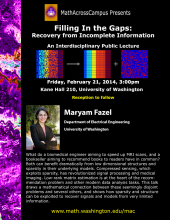What do a biomedical engineer aiming to speed up MRI scans, and a bookseller aiming to recommend books to readers have in common? Both can benefit dramatically from low dimensional structures and sparsity in their underlying models. Compressed sensing, which exploits sparsity , has revolutionized signal processing and medical imaging. Low-rank matrix estimation is at the heart of the recommendation problem and other modern data analysis tasks. This talk draws a mathematical connection between these seemingly disjoint problems and several others, and shows how sparsity and structure can be exploited to recover signals and models from very limited information.
Maryam Fazel is an assistant professor of Electrical Engineering at the University of Washington, with adjunct appointments in the departments of Computer Science and Engineering, Mathematics, and Statistics. Maryam received her MS and PhD in EE from Stanford University, her BS in EE from Sharif University of Technology in Iran, and was a postdoctoral scholar at Caltech prior to joining UW in 2008. She is a recipient of the NSF Career Award (2009), the UW EE Outstanding Teaching Award (2009), and coauthored a paper selected as a Fast-Breaking paper by ScienceWatch (2011). Her research interests are in convex optimization, machine learning, and signal processing.
